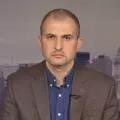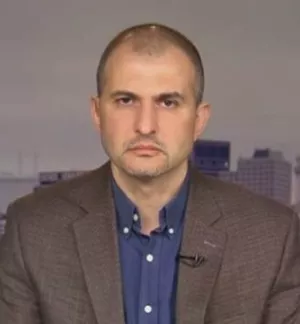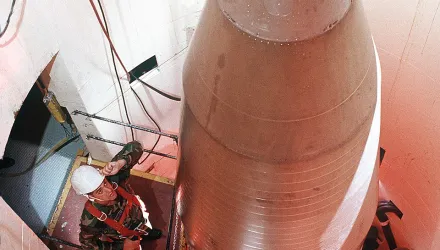No Tectonic Shifts in Foreign Policy Will Take Place Under Putin
Few leaders volunteer to significantly alter policies late in their rule, and Vladimir Putin—who has just won the presidential election—hardly wants to be an exception. Putin has had a significant say on most major issues during the presidency of his protégé Dmitry Medvedev, and hence is unlikely to order any tectonic shifts in Russia’s foreign policy when he returns to the Kremlin in May. “We will see continuity in foreign policy, and this can easily be explained: Russia’s foreign policy is largely based on the protection of our national interests, and our national interests have not changed,” Konstantin Kosachev, the outgoing first deputy chairman of the State Duma, told Interfax on March 3.
Reset the "Reset"
Russia’s Foreign Ministry sought to assure the United States of continuity in Moscow’s policy vis-à-vis Washington even before the official results of the March 4 presidential election were released. Deputy Foreign Minister Sergey Ryabkov told RIA Novosti on March 6: “We have no doubts about preserving continuity in our relations with the United States. Everything that has been achieved in recent years…has been achieved through consensus. Moscow unequivocally reaffirms its commitment to this work; there will be no reevaluation of values—that would be at odds with the country’s interests,” Ryabkov said.
Putin himself appears to be optimistic about the future of his country’s relations with the United States during his rule. “In general, we are prepared to make great strides in our relations with the United States, to achieve a qualitative breakthrough, but on the condition that the Americans are guided by the principles of equal and mutually respectful partnership,” Putin wrote in his February 27 op-ed “Russia and the Changing World” published in the Moskovskiye Novosti newspaper. “If we had managed to achieve a breakthrough on missile defense, this would have opened the floodgates for building a qualitatively new model of cooperation, similar to an alliance, in many other sensitive areas,” he wrote.
The Barack Obama administration also expects continuity in Russia’s U. S. policy under Putin. A senior Obama administration official quoted by The New York Times on March 6 said: “Privately they have said to us at the highest levels that the change in president will not mean a change in their policy toward the United States. Now we get to test that proposition.”
One fundamental problem with the U. S.-Russian “reset,” however, is that both sides have already picked all of the low-hanging fruit. Therefore, while there is hope that Moscow and Washington will eventually work out a deal on missile defence if President Barack Obama remains in office, reductions of non-strategic weapons, a new round of substantive UN Security Council sanctions on Iran or any other significant advances in the bilateral relationship would be much more difficult to attain.
Putin has already made it clear that Obama should not expect presents from him similar to Russia’s support for the UN Security Council resolution on Libya last year, when Moscow abstained from a vote that effectively led to the military intervention in the North African country. He also seems to have little appetite for Obama’s foreign policy priorities such as further bilateral nuclear reductions. “As for further steps in nuclear disarmament, those steps should be comprehensive in nature, and all nuclear powers should participate in the process. We cannot disarm while other nuclear powers are building up their arms,” Putin told a handpicked group of Russian defense experts in the Sarov nuclear research facility on February 24.
Should Obama be voted out of office, there will be a greater probability that U. S.-Russian relations may sour, given that all leading Republican contenders advocate a tougher stance on issues of importance to Russia, including missile defence. The absence of an economic foundation under the “reset” also bodes ill for the bilateral relationship, regardless of who sits in the White House and the Kremlin. Russia ranks 24th among U. S. trading partners and 25th on the list of direct investors in America. The United States is Russia’s 11th largest trading partner and 10th largest source of foreign direct investment, according to a recent report put out by the Harvard University’s Belfer Center and the Center for National Interest in Washington.
Love Europe
As for the European Union, Putin’s Russia should be expected to seek deepening economic, educational and cultural cooperation with Russia’s largest trading partner, pushing for a visa-free regime while at the same time focusing on bilateral cooperation with individual European powerhouses, such as Germany and France. When building relations with the EU, the new / old Russian leadership will also need to take into account the fact that Russian political and business elites have personally invested in Western European assets and have family members living in the West. A protracted economic crisis may make Russia more inclined to seek cooperation with the EU, which accounted for almost half of Russia’s foreign trade last year, if only to attract know-how and investment to modernize the Russian economy.
Putin has already indicated that he wishes to deepen ties with the rest of Europe. For instance, while lashing out at the United States during his annual live call-in show on December 15, Putin was much more accommodating when speaking about Europe, acknowledging that there are steps that Russia itself needs to take to integrate into Europe. “I still believe that it is inevitable. Life itself demands integration in Europe,” he said. “Does Russia have to do anything? Yes, it should scare its neighbours less; it should work to rid itself of this imperial image that prevents even Europe from cooperating with us.”
Manage the Middle East
While pursuing closer ties with Europe, Putin should also be expected to stay the course in the greater Middle East.
Under Putin, Russia will hardly want to support greater international pressure on Iran, even though it is in Russia’s vital interest to prevent an expansion of the nuclear club. Putin realizes that Russia has little leverage vis-à-vis Iran, which can easily choose another trading partner, such as China, while the Bushehr nuclear power plant has already been completed. Putin also realizes that Iran has formidable potential to act as a spoiler vis-à-vis Russia in the South Caucasus, the Caspian Region and Central Asia, as well as in Russia’s North Caucasus, where Islamists continue to run a campaign of insurgency and terrorism.
Putin has already made it clear that Russia will continue to oppose regime change in either Iran, Syria or elsewhere in the region stirred by the “Arab Spring.” Americans “speak about preventing proliferation, but in reality they mean a change of political regime” in Iran, Putin told defense experts on February 24. “No one should be allowed to use the Libyan scenario in Syria,” he warned in the February 27 op-ed that outlined his vision for Russia’s foreign policy.
In that op-ed Putin also indicated that he is prepared to drop Russia’s long-standing policy of opposing inclusion of the Taliban in power-sharing schemes in Afghanistan. “We do not object to the process of national reconciliation being joined by participants of the armed opposition, including the Taliban, on condition that they renounce violence, recognize the country’s Constitution and sever ties with al-Qaeda and other terrorist groups,” he wrote.
Respect Thy Neighbors
Putin should also be expected to continue cautious cooperation with China, which the International Monetary Fund expects to overtake the United States as the biggest economy in purchasing power parity terms in 2016. In his Moskovskiye Novosti article, Putin praised China’s economic growth, describing it as a “chance to get Chinese wind in the sails of the Russian economy.” He stressed that Russia and China share attitudes toward many issues of global and regional politics and the general vision of the global order in which states enjoy equal rights.
However, Putin is perfectly aware of the risks that the rise of China creates for Russia, even when he is publicly praising Russia’s eastern neighbor, which tops the list of Russia’s largest trading partner countries, accounting for ten percent of Russia’s foreign trade last year. China already has a population of 1.32 billion and its GDP totalled $ 5.926 billion in 2010, figures from the World Bank show. Russia’s population totals some 140 million and its GDP totalled $ 1.479 billion in 2010, according to the same source. The population density on the Chinese side of the border is 62 times greater than on the Russian side, Robert Kaplan wrote in a May 2010 article in Foreign Affairs. There seems to be a major geopolitical tradeoff in the making between Moscow and Beijing, and it is likely that Putin will not seek to revise it given that Russia has few instruments to ward off China’s dynamic growth, other than allowing it to tap into Russia’s vast natural, primarily energy resources, in return for which the Russian government secures economic and political stability at home.
Apart from bilateral disparities the Russian leadership is well aware of the fact that China is gradually moving to replace Russia in Central Asia as a political patron for the local governments, and has already become the key economic partner of the post-Soviet states there.
But while conceding to incremental expansion of China’s influence in Central Asia, Putin should be expected to put greater effort into advancing Russia’s own integration projects in the post-Soviet neighborhood, such as the Collective Security Treaty Organization, the Eurasian Economic Community and, to a lesser extent, the Commonwealth of Independent States. The latter is the second largest of Russia’s regional trading partners, accounting for 14 percent of Russia’s foreign trade in 2011. Under Putin these organizations will continue to serve as Moscow’s instruments in advancing Russia’s interest in friendly and stable neighbors and in dominating energy flows in Eurasia. And, while Putin may be largely content with Russia’s bilateral relationship with Central Asian states, Armenia, Azerbaijan and Belarus, he may need to make a greater effort than his predecessor to anchor Ukraine, whose relations with the EU and the United States have recently become strained, while keeping pressure on Georgia.
While essentially staying the foreign policy course, Putin—who has displayed a proclivity for lashing out at the West—has harsher words for Western powers than his predecessor, especially if the latter voice concerns over domestic affairs of Russia and its allies. “When human rights are defended from the outside on a selective basis and in the process of this ‘defense’ the very same rights of many people, including the most basic and sacred of them—the right to life—are trampled upon, then we’re not talking about a noble cause, but about elementary demagoguery,” Putin wrote in the Moskovskiye Novosti op-ed.
Naturally, being the world’s super power, the United States is the main target of Putin’s diatribes. Whether attacking Washington for supporting the “Arab Spring” or U. S. missile defense plans in Europe, Putin is never at a loss for words. But the prime target audience for Putin’s criticism of the United States is often his domestic constituency.
The past parliamentary and presidential elections have demonstrated that Putin’s domestic power base is shrinking, especially in large cities where many voters question the results of the polls and the legitimacy of Putin’s return to the Kremlin. To shore up support at home Putin could be expected to project himself as a more fervent guardian of Russia’s interests and its allies vis-à-vis the West than Medvedev while making sure his rethoric does not cross any lines that may cause substantial damage to the benefits that Russia derives from improved relations with both the United States and the EU achieved by his predecessor.
Saradzhyan, Simon and Nabi Abdullaev. “Dealing With the Outside World.” Russia Profile.org, April 5, 2012




